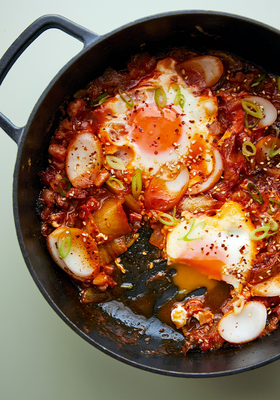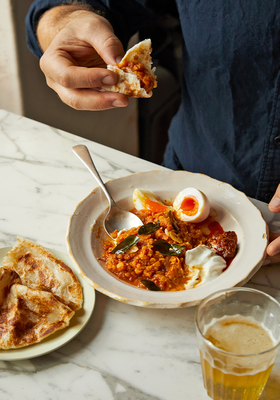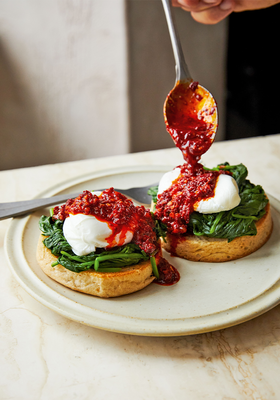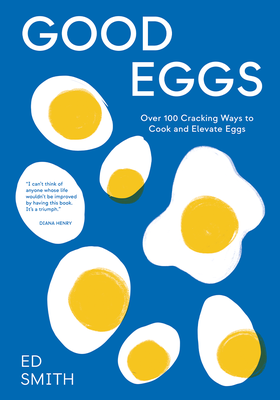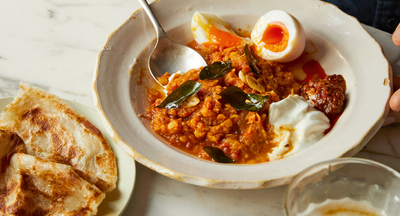
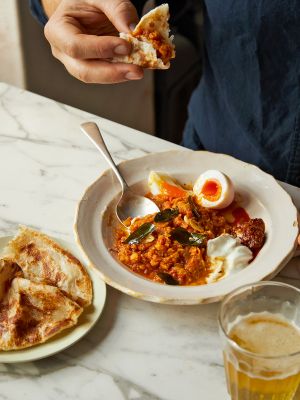
3 Great Egg Recipes For The Weekend
Good Eggs is a book about eggs when they are the centrepiece – whether fried, poached, boiled, baked, scrambled or set. It is a clutch of basic eggs with simple but effective embellishment; an eye-opening collection of timeless eggs from around the world; and a fair few boxes-worth of inspirational eggs with a contemporary twist. It is, quite simply, a compendium of... well, good eggs.
I am a recipe writer, a cookbook author and, for my sins, occasionally produce digital ‘content’. Which means I’m always cooking new things. But one food type, one meal, one frame of mind is a constant: most weekend mornings and many weekday lunchtimes, I take a moment to enjoy some eggs. On many occasions there’s a flourish of herbs, spices, a new oil, hot sauce or browned butter, or I’ll make an effort to eat them with a variety of different carbs or vegetables. At other times, it’s a new method or style that’s caught my eye in a book or online. Without fail, the result is grounding, familiar, and a pleasure. Eggs are the ultimate fast food. In less time than it takes to boil a kettle, properly toast and butter some bread, anyone can fry, fold, boil or scramble a few eggs.
Eggs are symbolic, playful, adaptable and universal, eaten more or less everywhere. There are thousands of egg dishes, cooked in differing ways that reflect the terroir and traditions of the cultures consuming them. There are few foods whose form can be so radically transformed by slight, often imperceptible variations to the way they’re prepared; few so at home in virtually every national cuisine; few so easily personalized, or so speedy to cook. I am an ovophile, but I know I’m not alone in enjoying them, nor is the frequency with which I eat them unusual. So I thought it opportune to share some of those experiences and experiments here.
Perhaps my only rule is that you should not cook eggs for more than three other people at once. I’m sure you could. I’ve no doubt you will try. But just don’t (and I say this as someone who grew up cooking in a family of six, and is happy running breakfast service in a busy café). Your kitchen is not a restaurant. Your eggs and your fellow eaters don’t need the flapping. And you don’t need the annoyance at either eating yours once everyone else has finished, or at messing up one or two (and for some reason having to have those yourself, despite having done the catering for everyone else). No thanks.
Kimchi & Gochujang Skillet Eggs
Taking much inspiration from a Korean kimchi jiggae (stew), these eggs are packed with flavour and extremely convenient. Sliced tteok (thin, pleasingly chewy and bouncy discs made of rice flour) are available online if not near you, and provide heft and texture to the dish. You could alternatively (or additionally) serve these eggs with plain rice, or scoop it up with any fresh, bouncy or pliable bread.
Pour a hint of oil into a 20-22cm frying set over a medium-high heat. Before the pan is hot, add the lardons, if using, and let these render and fry for 5 minutes until beginning to colour and crisp. Add the white parts of the spring onion, cook for 1 minute more, stirring, then add the kimchi, kimchi brine, gochujang and 100ml of water. Simmer for 5 minutes until the liquid in the pan is around 1cm deep.
Scatter in the rice cakes, then make wells in the mixture between mounds of kimchi and crack the eggs into them. Reduce the heat a little, cover and gently simmer for 2-3 minutes until the whites are set. Remove from the heat. If the whites aren’t firm by this point, keep the pan off the hob, but return the lid and check again after 30-60 seconds.
Scatter over the gochugaru flakes, sesame seeds and the spring onion greens. I like to eat this with a spoon, straight from the pan.
Runny-Yolked Eggs With Quick Dal & Paratha
I enjoy all types of dal alongside soft-yolked eggs, but this masoor-style dal is ace. And relatively speedy too, so legitimately something that could be cooked to sate a craving.
Set a medium saucepan over a moderate heat. Add 1 tablespoon of the oil, then add the onions and sauté for 10-15 minutes until sticky and bronze coloured. Add another tablespoon of oil along with the minced garlic and ginger, stir and cook for 2 minutes more, then add the ground spices, tomatoes and salt. Simmer energetically for 5 minutes to thicken and intensify.
Meanwhile, rinse the lentils until the water runs clear, drain, then transfer to a saucepan and cover with 750ml of water. Simmer until tender (around 15 minutes), then strain, reserving the cooking water.
Transfer the lentils to the thickened tomato sauce, add enough cooking water so that the consistency is similar to a loose risotto or porridge (scoop-able) and keep blipping away for 5 minutes more.
Heat the remaining 2 tablespoons of oil in a small pan and add the sliced garlic, cumin seeds and curry leaves. Fry for 1-2 minutes until fragrant, then drizzle it over the dal before anything burns. Remove the dal from the heat.
Cook or warm the paratha in a dry pan while the lentils are cooking. Keep warm within the folds of a clean dish towel.
Around the same time, lower the eggs into a saucepan of boiling water and simmer for 6.5 minutes. Transfer to a bowl of ice-cold water, or chill under a cold running tap, then peel the eggs and, if necessary, leave in the water while finishing the other elements.
Assemble the dal and paratha on plates or in shallow bowls, add the eggs, cutting so the yolks spill out, and serve with spoonfuls of yoghurt and pickles to taste.
Poached Eggs With ’Nduja Butter & Spinach
Calabrian ’nduja is fiery, fruity and salty. Ideal with eggs, then. It mellows a little once incorporated into melted butter – although admittedly that is still a rich combination; even more so when joined by molten egg yolk. But there’s balance here, with the ooze offset by the purity of the poached whites, plus a soft bed of spinach and English muffins, which soak everything up. Glorious.
Gently melt the ’nduja and butter together in a small saucepan over a very low heat. Prod and stir until combined. The sauce should be loose and glossy – don’t let this boil or fry, otherwise the pork in the ’nduja hardens and the butter and sauce will split. Remove from direct heat while you assemble the other components.
Wilt the spinach in a large sauté or frying pan set over a medium-high heat. Add a tablespoon of water to encourage the cooking process (no need for butter or oil – there’s enough already in this dish). Once cooked, squeeze away any excess liquid. Season generously with salt and pepper.
Meanwhile, toast and butter the muffins and poach the eggs.
Serve, topping the toasted muffins with mounds of spinach and the poached eggs. Give the ’nduja butter a good stir, then spoon over the to
Good Eggs by Ed Smith is available to buy here. For more ideas, follow Ed at @RocketAndSquash
All products on this page have been selected by our editorial team, however we may make commission on some products.
DISCLAIMER: We endeavour to always credit the correct original source of every image we use. If you think a credit may be incorrect, please contact us at [email protected].
